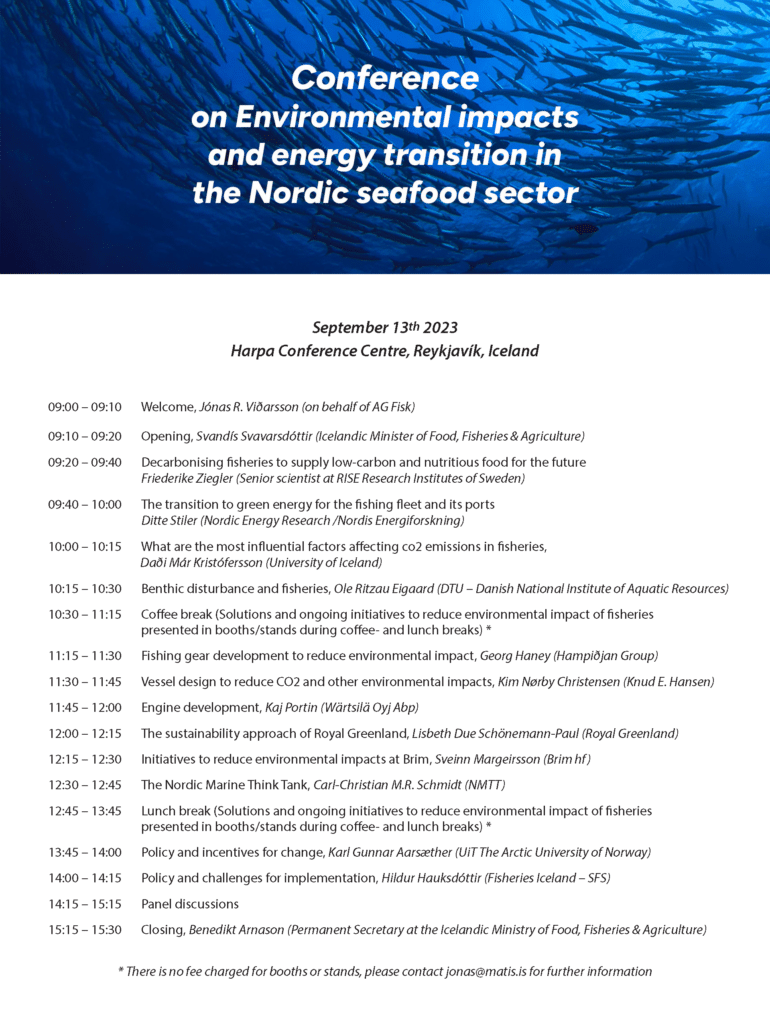Seafood is generally a climate-efficient and nutritious type of food. Consumers, however, are often confused as to whether seafood is sustainable or not and what seafood to choose. The Nordic seafood sector now has the opportunity to take the lead in transitioning to low greenhouse gas emissions through energy efficiency measures and shifting to alternative fuels.
The Working Group for Fisheries (AG-Fisk) within the Nordic council has recognized this, and as part of Iceland's presidency of the council in 2023, has initiated this project, to facilitate networking among stakeholders, raise awareness and share knowledge on past-, present- and future advances in reduction of environmental impacts in Nordic seafood value chains. The highlight of the project was a conference that was held in Reykjavík on 13 September 2023 in Reykjavík.
Click on the name of each lecture to see the slides from the event
- 09:00 – 09:10 Welcome, Jónas R. Viðarsson (on behalf of AG Fisk)
- 09:10 – 09:20 Opening, Svandís Svavarsdóttir (Icelandic Minister of Food, Fisheries & Agriculture)
- 09:20 – 09:40 Decarbonising fisheries to supply low-carbon and nutritious food for the future. Friederike Ziegler (Senior scientist at RISE Research Institutes of Sweden)
- 09:40 – 10:00 The transition to green energy for the fishing fleet and its ports. Ditte Stiler (Nordic Energy Research /Nordis Energiforskning)
- 10:00 – 10:15 What are the most influential factors affecting co2 emissions in fisheries? Daði Már Kristófersson (University of Iceland)
- 10:15 – 10:30 Benthic disturbance and fisheries, Ole Ritzau Eigaard (DTU – Danish National Institute of Aquatic Resources)
- 10:30 – 11:15 Coffee break (Solutions and ongoing initiatives to reduce environmental impact of fisheries. Presented in booths/stands during coffee- and lunch breaks) *
- 11:15 – 11:30 Fishing gear development to reduce environmental impact, Georg Haney (Hampiðjan Group)
- 11:30 – 11:45 Vessel design to reduce CO2 and other environmental impacts, Kim Nørby Christensen (Knud E. Hansen)
- 11:45 a.m. – 12:00 p.m Engine development, Kaj Portin (Wärtsilä Oyj Abp)
- 12:00 – 12:15 The sustainability approach of Royal Greenland, Lisbeth Due Schönemann-Paul (Royal Greenland)
- 12:15 – 12:30 Initiatives to reduce environmental impacts at Brim, Sveinn Margeirsson (Brim hf)
- 12:30 – 12:45 The Nordic Marine Think Tank, Carl-Christian MR Schmidt (NMTT)
- 12:45 – 13:45 Lunch break (Solutions and ongoing initiatives to reduce environmental impact of fisheries. Presented in booths/stands during coffee- and lunch breaks) *
- 13:45 – 14:00 Policy and incentives for change, Karl Gunnar Aarsæther (UiT The Arctic University of Norway)
- 14:00 – 14:15 Policy and challenges for implementation, Hildur Hauksdóttir (Fisheries Iceland – SFS)
- 14:15 – 15:15 Panel discussions
- 15:15 – 15:30 Closing, Benedikt Arnason (Permanent Secretary at the Icelandic Ministry of Food, Fisheries & Agriculture)
The event was recorded. Watch the videos here:
Part 1:
Part 2:
Part 3:
Workshop on Environmental impacts and energy transition in the Nordic seafood sector
Time: 12 September 2023
Location: Matís, Vínlandsleið 12, Reykjavík, Iceland
The workshop will focus on knowledge exchange, networking and defining research priorities. Possible research projects will be explored and if relevant initiated, which will include presenting and reviewing funding opportunities.
Participation at the workshop is by invitation only, but interested participants can express interest in taking part by contacting jonas@matis.is
News and interesting background materials relevant for the project:
On 21 February 2023, the European Commission published a 'fisheries and oceans' package, which includes an action plan on decarbonising EU fisheries and aquaculture. The plan outlines two directions of change: it aims to increase energy efficiency in the short to medium term, while making a gradual switch from fossil fuels to renewable and low-carbon energy sources.
On 2 June 2023, the European commission published a report titled "Decarbonising the fishing sector: Energy efficiency measures and alternative energy solutions for fishing vessels”. The report reviews the literature on drivers of energy use, identifies potential reduction measures and provides an overview of opportunities for using alternative fuels in the fishing sector. Each measure is evaluated in terms of greenhouse gas emission reduction potential and costs, and challenges and policy options that could facilitate implementation. A timeline lists measures that could be implemented in the shorter and longer term, on the basis of scientific and gray literature, projects and expert interviews. The report is available here
In 2021 Sale et al. published in NATURE a paper that claimed that global bottom trawling releases as much carbon as air travel. The paper received great attention and has been debated heavily since then. In 2023 Hiddink et al. published also in NATURE a paper that refutes the assertion in the paper of Sale et al. (2021). The issue remains debated and it is clear that more research is needed.
Sale et al. 2021 is one of the most covered fishery-related journal articles of recent years, and has been quite controversial. The third official critique of Sala et al. 2021 was published in Nature in September of 2023. The paper by Ovando et al. 2023 criticizes the food provisioning model that claimed a 5% increase in MPAs would lead to 20% more seafood production. It is the same model from Cabral et al. 2020 that was eventually retracted. Max Mossler has provided a good overview discussion on the topic and the critique here.


